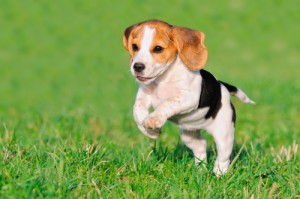There’s nothing like waking up on Christmas morning to the first meeting of a new furry family member! I remember how it felt to embrace my new friend (wiener dog) wrapped in a bow, underneath the Christmas tree like it was yesterday. The first few weeks after his arrival were equally as hard to forget, the reality beginning to set in sometime during house training. “He’s so cute! But wait, he’s turned the house into a giant bathroom!“
Since puppies are in their very tender stage of growth and development, they eat often, play hard, and element more waste than you think their little bodies can manage! At this early stage in their lives, they haven’t developed the bladder and bowel control that mature dogs have. So naturally, just like when their in the litter, they eliminate where ever and when ever they can. House training is the solution, but it will require a few best practices of the new dog-owner to be executed as smoothly and successfully as possible.
Rule #1 Commitment
House training a puppy begins on day one, this means that you have to make a commitment immediately. Make a commitment to understanding the puppy and solving the problem based on that understanding. One of the problems initially is that new puppies haven’t recognized your home as their home or “den” yet. And, until they do, their not going to stop eliminating in the house. In order to put your commitment into practice you have to watch them like a hawk! Don’t let them turn any corner without checking on them, and when they look like their ready to squat take them out of the house. Committing to this practice is the first step to successful potty training.
Rule #2 Consistency
 There may be one person or multiple people in the house that are going to be involved in house training the new pup. The more the merrier as they say! Keep in mind that puppies need consistency if there going to learn anything in a short amount of time. Designate a space outside for your pup to take a potty break, and stick to it. Whoever is taking the dog out should go to the same place every time and reward them with treats and attention when they do!
There may be one person or multiple people in the house that are going to be involved in house training the new pup. The more the merrier as they say! Keep in mind that puppies need consistency if there going to learn anything in a short amount of time. Designate a space outside for your pup to take a potty break, and stick to it. Whoever is taking the dog out should go to the same place every time and reward them with treats and attention when they do!
Another routine to get them into is a feeding schedule. This will help you in your potty training efforts as well because you’ll be able to designate certain times for potty breaks that become second nature to the pup. Some dogs go right after they eat, some dogs take a bit longer. The set feeding schedule will help you figure out what those times are and when its time to go out.
Rule #3 Patience
You don’t have to scold your dog for every mistake. Mistakes will happen! There are things you can do to help make sure they aren’t given the chance to soil the house. One of the best ways to do this is to keep your hawk eye on them.
A tip from humanesociety.org is to pick up your puppy’s water dish 2 1/2 hours before bed time. Most puppies will sleep seven hours without needing to eliminate. If they do have an accident during bedtime, be sure to quietly take them out for a potty break and return them to bed immediately. It is important to remember that when potty training, the goal is use these best practices to eliminate accidents completely. Keep in mind that puppies aren’t completely potty trained for approximately 6 months. Practicing patience is key!
Keep to these practices to the best of your ability and you will have a better time house training your pup. Leave a comment if you have any other questions! These are great tips starting out, but every situation is unique.



